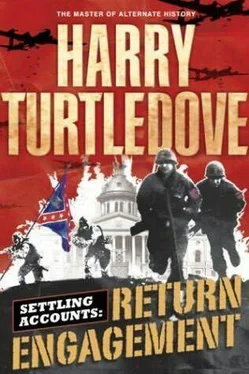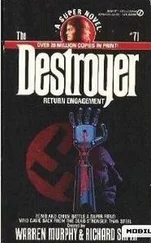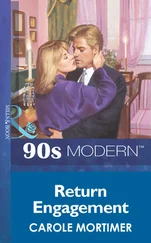Harry Turtledove - Return engagement
Здесь есть возможность читать онлайн «Harry Turtledove - Return engagement» весь текст электронной книги совершенно бесплатно (целиком полную версию без сокращений). В некоторых случаях можно слушать аудио, скачать через торрент в формате fb2 и присутствует краткое содержание. Жанр: История, на английском языке. Описание произведения, (предисловие) а так же отзывы посетителей доступны на портале библиотеки ЛибКат.
- Название:Return engagement
- Автор:
- Жанр:
- Год:неизвестен
- ISBN:нет данных
- Рейтинг книги:5 / 5. Голосов: 1
-
Избранное:Добавить в избранное
- Отзывы:
-
Ваша оценка:
- 100
- 1
- 2
- 3
- 4
- 5
Return engagement: краткое содержание, описание и аннотация
Предлагаем к чтению аннотацию, описание, краткое содержание или предисловие (зависит от того, что написал сам автор книги «Return engagement»). Если вы не нашли необходимую информацию о книге — напишите в комментариях, мы постараемся отыскать её.
Return engagement — читать онлайн бесплатно полную книгу (весь текст) целиком
Ниже представлен текст книги, разбитый по страницам. Система сохранения места последней прочитанной страницы, позволяет с удобством читать онлайн бесплатно книгу «Return engagement», без необходимости каждый раз заново искать на чём Вы остановились. Поставьте закладку, и сможете в любой момент перейти на страницу, на которой закончили чтение.
Интервал:
Закладка:
"No. Looks to me like we could have practiced sewing each other up," O'Doull said.
"Suture self, Doc," McDougald said. O'Doull sent him a reproachful stare. The other man didn't seem to notice he'd been reproached. Anyone who'd say something like that probably wouldn't notice such a thing.
Then O'Doull threw himself flat in the trench again. Two more shells came down, one on the tent, the other close by it. He and McDougald would have been in no position to do any sewing after that. Light a candle for me, Nicole, he thought, and wondered if he'd ever see Riviere-du-Loup again.
Mary Pomeroy hugged her mother. "So good to see you, Ma," she said.
"You, too, dear," Maude McGregor answered. "It was a nice visit, wasn't it?"
"I sure thought so," Mary answered. "Easier to get out of town now that Alec's in kindergarten." She made a sour face. "Even so, I wish I didn't have to send him. The Yanks make teachers fill up the children's heads with the most fantastic lies you ever heard."
"You don't want to get in trouble for leaving him out, though," her mother said. "You don't want to get in trouble at all, especially after all the lies Wilf Rokeby told about you."
"I know, Ma," Mary said, and said no more. She knew Wilf Rokeby hadn't told lies. She knew her mother knew, too. Maude McGregor never would have said so, though, even if you put her on the rack. There were things she carefully didn't see. She hadn't seen them when her husband was alive, and she didn't see them when she looked in her daughter's direction, either.
She'd never asked, for instance, why Mary spent half an hour or an hour or an hour and a half of each recent visit to the farm out in the barn by herself. She never came out to see what her daughter was doing there. She didn't want to know-or rather, to know officially.
All she said now was, "Whatever you're doing, be careful about it."
Gently, Mary answered, "I'm always careful, Ma," and her mother nodded. Mary knew she hadn't been careful enough with Wilf. She'd dodged the immediate danger, but the postmaster had brought her to the occupiers' notice.
The Yanks suspected Pa, but he kept on going, Mary thought fiercely. I can, too. As long as they only suspected, what could they do? They'd never found any evidence against her. They'd never found any evidence against her father, either, till things went wrong when he threw the bomb at General Custer. And if Custer hadn't been more alert than an old man had any business being, Pa might have got away with that, too.
"I'll see you before too long," Mary said. Her mother nodded. The two women embraced. Mary went out to the Oldsmobile. She started the auto and drove away from the farm where she'd grown up.
What went through her mind was, I have to be extra careful now. If the Frenchies caught her with a bomb in the Olds, everything was over. They had no particular reason to search it, but…
Even when she used the bomb, she had to be extra careful. If it went off somewhere too close to Rosenfeld, that would make the occupiers wonder. She muttered to herself as she drove across the vast, wintry Manitoba prairie. The Olds was almost the only motorcar on the road. What she didn't know was how active the overall resistance against the Yanks was. How many things happened that never got into the newspapers or on the wireless? If the Americans were smart-and they were, damn them; they were-they would keep most of those things quiet.
If she wasn't the only one fighting the Yanks in this part of the province, though, then one more bomb wouldn't mean so much. It wouldn't necessarily make the occupiers look toward her. If nobody else was giving them trouble, that was a different story.
She sighed. She hadn't heard anyone else's bombs blow up in Rosenfeld. A lot of the farmers in these parts were Mennonites who went along with the central authority, whatever it happened to be. But there had been that pamphlet, the one she'd turned against Rokeby. Somebody had put it out.
About ten miles west of Rosenfeld lay Coulee, an even smaller town. Like Rosenfeld, Coulee would have had no reason to exist if not for the railroad. It was a place where people loaded grain; Mary had trouble imagining anyone getting off the train in Coulee without the immediate, intense desire to get right back on again. People in Rosenfeld hardly ever thought about Coulee; when they did, it was usually with a condescending smile. Even in Rosenfeld, people needed someone to feel superior to.
The paved road to Coulee paralleled the train tracks. It went on right through the town. Mary got off the paved road before Coulee, went around the place on lesser tracks like the one that led to her family's farm, and then got back on to drive for another couple of miles.
She stopped the auto there and pulled off to the side of the road. When she got out of the Olds, she looked both east and west. Nobody coming in either direction-that was what she'd wanted to see. She remembered the Quebecois soldiers who'd appeared out of nowhere while her family was picnicking. Having a patrol show up now wouldn't do at all.
No patrol. There were too many miles of railroad, not enough soldiers to keep an eye on all of them all the time. Mary opened the trunk. She carried the box in it over to the railroad tracks, then came back. As she returned, she scuffed and kicked the footprints she'd made in the snow till they were unidentifiable. She drove the auto back onto the road and did the same thing to the tire tracks. The occupiers would be able to figure out where she'd planted the bomb. The explosion itself would tell them that. Who she was, or even that she was a she? No. Not if she could help it.
Mary drove back to Rosenfeld the same way as she'd come west, skirting Coulee. Nobody in the town would see the Oldsmobile. She tried to use different little country roads heading east. She didn't want a farmer remembering he'd seen the same auto coming and going in a short stretch of time.
She got back to her apartment less than an hour later than she would have if she'd come straight from the farm. Who was to say when she'd broken off her visit with her mother? Mort might notice that the gas gauge on the motorcar was down a little farther than it should have been. But so what? Even if he did, would he turn her in to the occupiers? Not likely!
All the way back to Rosenfeld, she'd listened for an explosion. She hadn't heard one. Maybe no train had gone through during her drive. Maybe she'd got too far away for the sound to carry. Or maybe the bomb had failed. That was an unwelcome possibility, but one she couldn't ignore.
As soon as she got into the apartment, she used a nail file to get rid of the dirt from the barn and washed her hands. Drying them, she felt a little like Lady Macbeth-another stubborn Scotswoman advancing her cause no matter what.
Music blared from the wireless when she turned it on. It was twenty minutes to the hour, so she had a while to wait before she could hear the news. She used the time to good advantage, making herself a cup of coffee and sitting down with a mystery story set in Toronto before the Great War. She knew what she was doing-pretending things hadn't changed since. Again, so what?
When the news came on, it talked about an American submersible torpedoing a Japanese cruiser somewhere in the Sandwich Islands. It talked about U.S. bombing raids on Confederate cities, and about Confederate terror attacks on U.S. cities. Mary sneered. She knew propaganda when she heard it. The wireless talked about U.S. progress in Utah. It talked about an Austro-German counterattack against the Tsar's armies in the Ukraine, and about a German counterattack against the British near Hamburg.
It talked about cuts in the coal ration for Canada, and about reductions in civilian seat allocations on the railroads here. Bombs on the tracks? Not a word.
Читать дальшеИнтервал:
Закладка:
Похожие книги на «Return engagement»
Представляем Вашему вниманию похожие книги на «Return engagement» списком для выбора. Мы отобрали схожую по названию и смыслу литературу в надежде предоставить читателям больше вариантов отыскать новые, интересные, ещё непрочитанные произведения.
Обсуждение, отзывы о книге «Return engagement» и просто собственные мнения читателей. Оставьте ваши комментарии, напишите, что Вы думаете о произведении, его смысле или главных героях. Укажите что конкретно понравилось, а что нет, и почему Вы так считаете.












